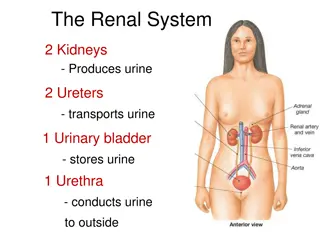An Overview of the Renal System and Nephron Anatomy
The renal system consists of the kidneys, ureters, urinary bladder, and urethra, responsible for producing, transporting, storing, and excreting urine. The kidneys are surrounded by three layers, and the nephron is the functional unit responsible for filtering blood and producing urine. Key componen
4 views • 26 slides
Understanding Kidney Physiology and Function in the Human Body
Kidneys play a crucial role in regulating arterial blood pressure, erythrocyte production, glucose synthesis, and filtration through nephrons. They cannot regenerate nephrons, leading to a gradual decrease in function with age. Key structures like the hilum, renal artery, and vein, as well as the ne
0 views • 127 slides
Understanding Diabetic Glomerulosclerosis in Renal Disorders
Diabetic glomerulosclerosis is a condition characterized by thickening of the glomerular basement membrane, leading to increased permeability. It belongs to diabetic nephropathy and poses a risk for pyelonephritis. The progression of this disease involves the deposition of proteins in the mesangial
0 views • 19 slides


